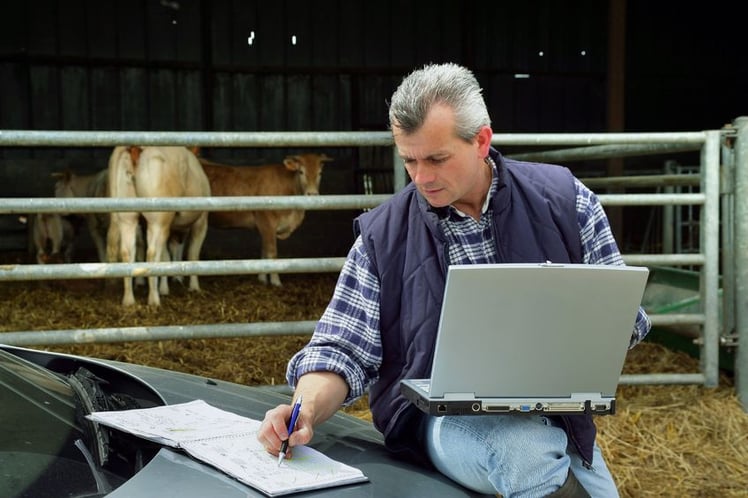
As agriculture moves into the 21st century, many businesses have started using data and analytics to try and see trends hidden in the numbers. From high-tech startups in Silicon Valley to Major League Baseball, owners saw risky businesses flourish and thrive; analytics even broke the Curse of the Bambino, with the data-driven Theo Epstein leading the Boston Red Sox to win their first World Series in 86 years. Nothing is stopping farmers from applying these same principals to, among other things, track soil conditions, crop yields, and project the best time for harvest. Data and privacy laws can be unfamiliar to Siouxland farmers, but here are the 6 things that you should know:
1. Finding an Agriculture Technology Provider (ATP) is the Way to Go
There are plenty of ATP’s roaming the Midwest that want to provide data for farmers who might be unfamiliar with the technological offerings available. These companies might ask for very small plots of land to use as control plots in order to measure soil, rainfall, climate conditions, etc., as well as random samples from throughout your field. Working with them means that they’ll learn more about your farm, and as experts, they’ll give you the information you need in plain English.
2. Understand that your Data Belongs to You!
Here is the first worry that a lot of farmers have about bringing in outside help like ATP’s; that they’ll come in, and then sell your information to your competitors or will hold your data hostage for hidden fees later on. Legally, any data that was gathered on your land is your property, and the ATP has no right to sell your property to an interested third party. Signing a contract with an ATP usually sets guidelines about what information you’re paying for and when you’ll receive it. Farmers also have the right to secure destruction, removal, or return of any data that an ATP gathered.
3. ATP's won't be Your Businessmen
ATP’s have one job, to give you information. It is the farmer’s responsibility to handle this data and share it with other interested parties, like other stakeholders, tenants, landowners, and local cooperatives. Many times, nearby farms agree to share data in order to get a more accurate reading, or to try and find out why there are differences. With more information than farmers have had in the past, many farms are producing record crop yields while ensuring that their land will remain as fertile as possible.
4. ATP's Must Tell You How They Are Gathering Data
ATP’s understand that farmers can be a little sensitive around their crops, and new farm data gathering laws express that ATP’s must notify farmers what data they will be collecting, where they will be gathering it, and for what purposes it is being collected. Data providers must be able to provide these notifications in easily accessible formats, like e-mails through PDF’s or even “old-school” binders. ATP’s also have to be transparent through the data, and able to answer questions.
5. Third Parties Can Offset a Lot of the Costs
While the idea of outside interests like insurance companies and farm equipment manufacturers can sound intrusive, they can help you as much as the ATP’s. Many ATP’s will ask if they can sell your data to interested third parties, often to compensate farmers. These companies then use this information to target specific business plans towards helping farmers with specific issues. For examples, ATP’s found that farmers in western Indiana were having trouble with crops that were drowning in excess rainwater. Manufacturers then developed drainage tiles specifically for Indiana farms while ag R&D companies tried to develop crops to better withstand more precipitation. While the data is yours, and legally you don’t have to give permission, selling it to third parties can help you as much as you help them.
6. Farm Data Privacy Laws Help You Learn about Your Farm
In a study of American farmers, 77% were unsure or concerned about their data privacy while 84% were unaware of most data analytics terminology. These numbers show that it isn’t unwillingness to move forward with technology, but rather a lack of knowledge and communication between farm data analysts and gatherers. Farm data privacy laws ensure that small family-owned farms are given the same advantages as large, multi-billion dollar enterprises. They also make ATP’s work with farmers to inform them about their data and walk them through unfamiliar territory.
Whether or not most farmers want it, they will need to evolve to 21st century thinking in order to compete in an increasingly global market. Farm data privacy laws are in the books to protect every farm’s intellectual property and ensure that their data isn’t being sold to companies without permission. Analytics is the future of so many different businesses, and the agricultural world is no exception.
If you’d like to know more about this blog, or agricultural law, please contact one of our attorneys at info@goosmannlaw.com. For any other questions or comments, contact Goosmann Law Firm below.






Let Us Know What You Thought about this Post.
Put your Comment Below.